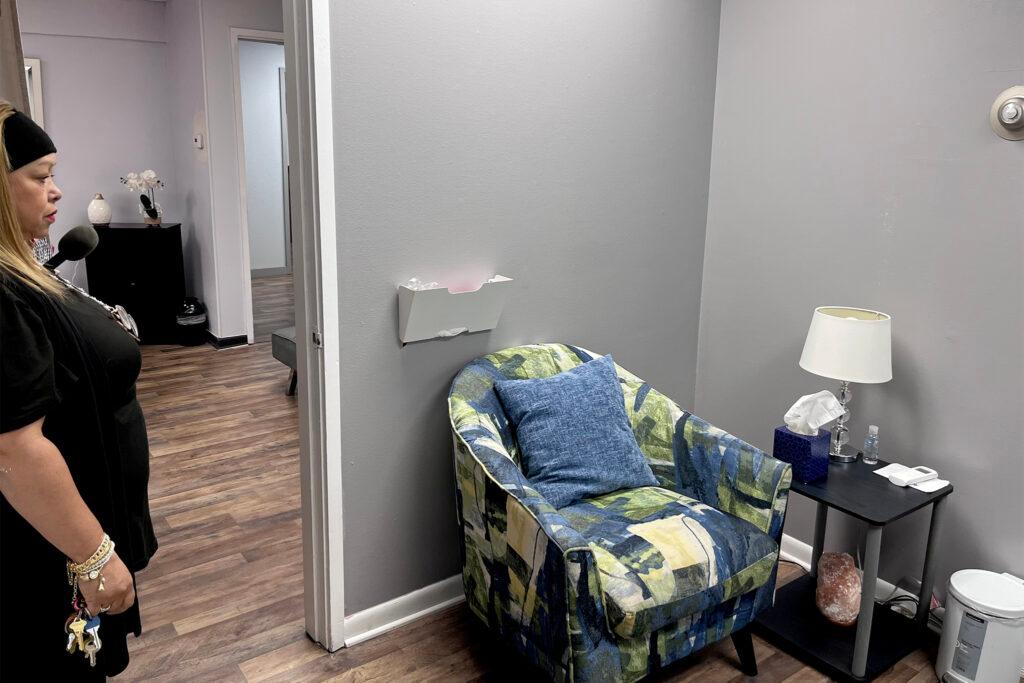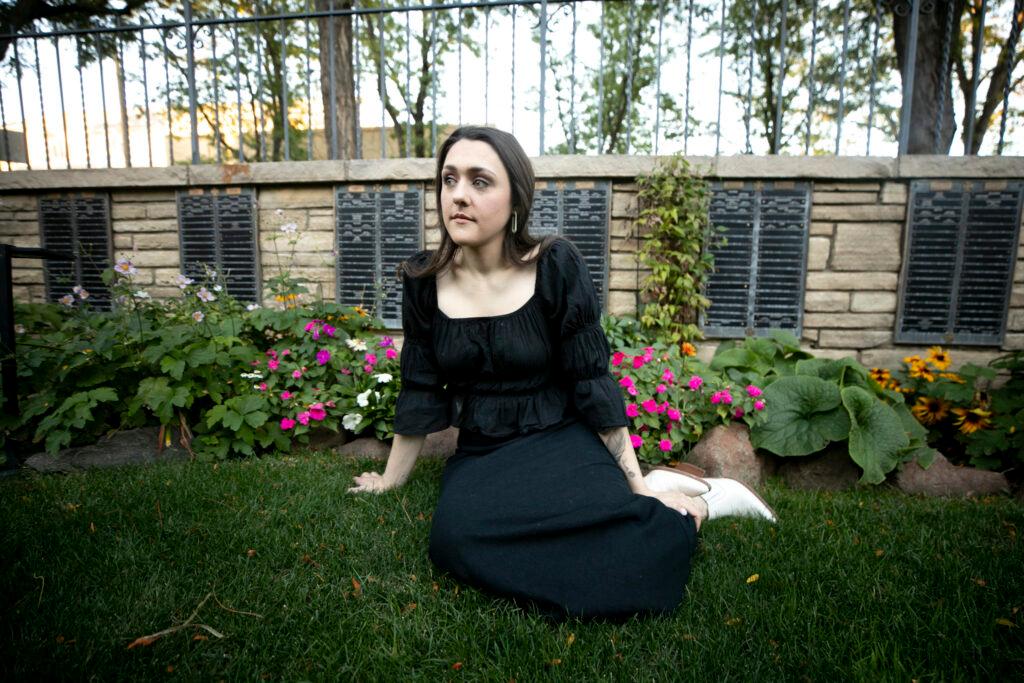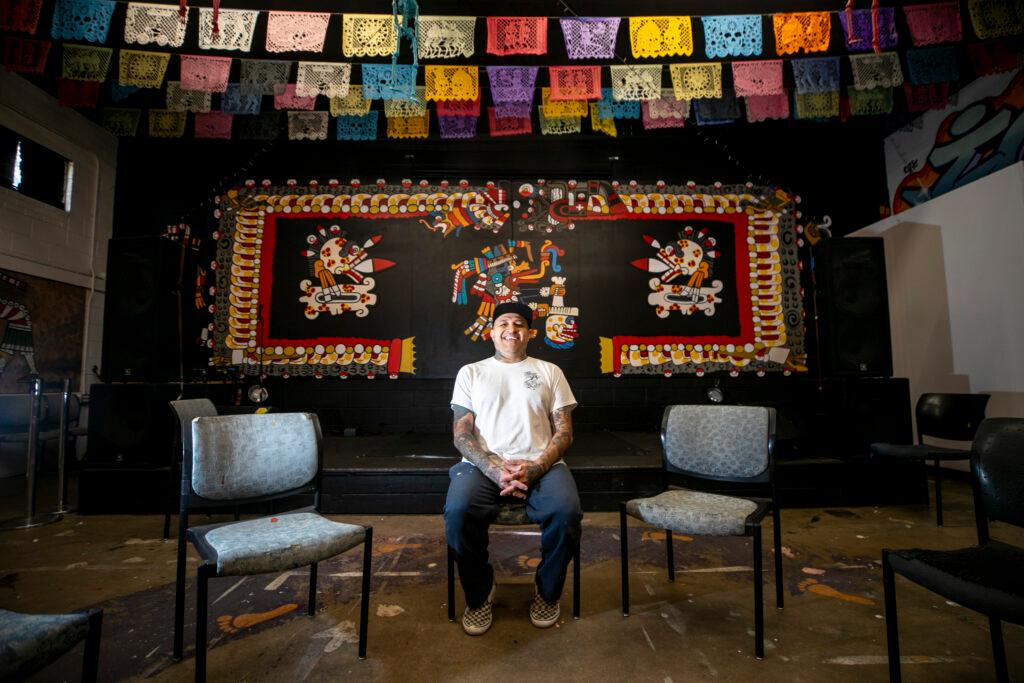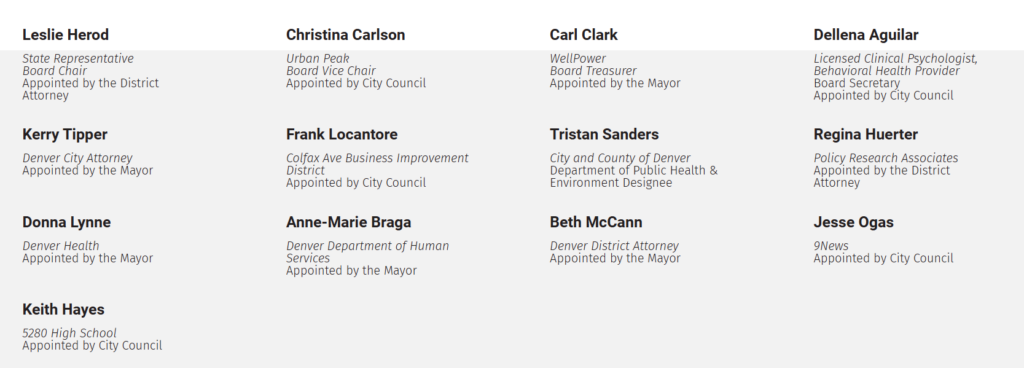

Backers of a Denver mental and behavioral health tax promised a "gamechanger."


Millions went to nonprofits run by unlicensed directors, some with long criminal histories.


With limited transparency, the money was spent but has not had the impact supporters envisioned.


Cash for Caring: How millions in tax money has failed to deliver a change to Denver's mental and behavioral health needs
By Ben Markus, CPR News
Published December 2, 2024
Editor's Note: This story contains discussion of mental illness, substance abuse and self-harm. If you or someone you know is considering suicide or other acts of self-harm, please contact Colorado Crisis Services by calling 1-844-493-8255 or texting “TALK” to 38255 for free, confidential, and immediate support.
The campaign’s premise was simple: For nothing more than a modest sales tax increase, Denver could create a $45 million-a-year stream of grants to nonprofit mental health and drug treatment programs.
“This initiative will give us the capacity to get everybody who needs help into a place where they can get the help that they need,” said Dr. Carl Clark, the president and CEO of WellPower, a large Denver community mental health provider.
“It's the type of thing that is a gamechanger.”
Voters enthusiastically bought into the concept. And after six years and more than $170 million in tax dollars granted, a year-long review by CPR News found that the game has indeed changed, but perhaps not in the ways supporters and voters envisioned.
Caring for Denver, the not-for-profit organization that advocated for the tax and now manages it, has funnelled millions of dollars from Denver taxpayers to programs — some of them outside the city — with no history of providing behavioral or mental health resources, who also have no staff licensed by the state to provide professional counseling or drug addiction treatment. Other nonprofits appear to have misrepresented their partnerships with city and state agencies.
Millions more have gone to programs run by convicted felons, in some cases with prison stints that had barely ended before their ideas were funded by Denver taxpayers. One anti-violence nonprofit received nearly half a million tax dollars despite a history of domestic violence alleged to have been committed by its executive director, who now sits in the Adams County Jail awaiting trial for first-degree murder.
“This is disturbing information for me,” Denver Auditor Timothy M. O’Brien said after being briefed on CPR News' findings. “The oversight of the grants and contracts is poor at best.”
At the same time, Caring’s most attention-grabbing campaign aspirations have not come to pass.
“We have the power to end overdose,” said the author of the initiative, State Rep. Leslie Herod, on the campaign trail in 2018.
That has not happened. Not even close.
A record 598 people died in drug-related cases last year in Denver. The suicide rate in the city rose to the second highest level in two decades last year — the highest rate in the metro area. Surveys conducted by the Colorado Health Institute show that the need for mental health care in the city of Denver has never been greater, yet access to services has never been harder to obtain.
It is difficult to measure the effectiveness using citywide metrics of any mental health and substance abuse program, especially during a pandemic and amidst an influx of dangerous drugs like fentanyl, but other counties without Caring for Denver money, like Adams and Jefferson County, experienced a decline in the suicide rate and fatal overdoses in 2023.
Larimer County passed a mental health sales tax of exactly the same rate in the same year as Denver. They built a facility for acute mental health care in Ft. Collins and grant about $3 million a year to a variety of governmental and nonprofit groups. Every grant is approved by the county board of commissioners following public hearings. There, the suicide rate has declined substantially, down 28 percent since 2018.
Herod made her comment about the power to end overdose while visiting Denver’s Harm Reduction Action Center on the campaign trail for Caring for Denver and her own state House seat in August 2018. She made no promises about mental health, but said that through programs like harm reduction — directly engaging with drug users — lives could be saved and overdoses ended.
“If I've overstated that Caring for Denver could solve all of Denver's mental health problems, then I overstated that,” Herod said in an interview with CPR News. “I don’t believe that I did.”

To examine the stewardship of Caring for Denver and the effectiveness of the programs it funds, CPR News relied upon the organization’s annual reports to catalog more than 450 grants it issued to more than 200 organizations from 2020 to 2023. CPR News then used available public records, including tax returns filed with the Internal Revenue Service by most of the non-profits and reports some of them filed with government agencies, to chart their growth and, where possible, how they spent the money.
But while Caring for Denver is fully funded by taxpayers, the organization declined to produce many of its own records requested by CPR News. Relying on the advice of an attorney, Caring for Denver Executive Director Lorez Meinhold said she does not believe the public is entitled to see all the details of how the organization spends tax money. One section of its contract with the city requires Caring to comply with applicable laws, including the Colorado Open Records Act, but Meinhold and Caring’s attorney pointed to a separate section of the contract and the city municipal code related to Caring that they interpret as saying only documents presented to the organization's board are considered public.
The result is that Caring views many of the documents it holds to be exempt from public disclosure.
"The documents you requested: grant applications, scoresheets, and rankings, and reports from grantees - either do not exist or were not shared at a board meeting," Meinhold wrote in response to a records request filed by CPR News.
After the intervention of a board member, the foundation did release some grant applications, along with some basic one-page summaries. But while asserting that Caring staff closely monitor grantees, including sometimes conducting audits, Caring refused to release any reviews or audits of grantees. Grantees in several cases also declined to share the reports they filed with Caring.
“I’m worried in particular about the transparency that I expect of city departments, of our legal teams, of grantees that we give city dollars to,” said Denver City Councilwoman Jamie Torres. “And onerous or not, that is one of the ways we're able to demonstrate to taxpayers: here's where your dollars went.”
O’Brien, the city auditor, agreed.
“I don't think you have to be a private investigator or anything to know that when somebody doesn't want to look at information you probably need to look at it,” O’Brien said.


To the victor...
Herod said she was inspired to ask Denver voters to approve the Caring for Denver tax by a similar tax in Seattle. With funding from the Mental Health Center of Denver, now called WellPower, the coalition of providers and advocates collected enough signatures to place the Caring concept and accompanying tax on the 2018 ballot in Denver.
The campaign ran no commercials, but relied on telling personal stories through social media, emphasizing that almost everyone is affected by suicide or drug addiction in some way. With no organized opposition, the campaign resonated with voters, who approved it with 70 percent of the vote. The tax, which amounts to 25 cents on a $100 purchase, is applied to most retail sales and services in Denver. Based on its winning margin at the polls, it is among the most popular tax initiatives ever in Denver.
After the initiative passed, the backers set up a nonprofit called Caring for Denver Foundation to distribute the tax money. Denver’s Department of Public Health and Environment, based on advice from the city attorney, determined the foundation was the only qualified entity to manage the money. No bids were sought. Meinhold, who helped write the ballot initiative, became the executive director, and by 2020, Caring for Denver was pushing millions of tax dollars to an array of nonprofits and government agencies.
There were a few restrictions. Among them: the money must be spent solely on Denver residents, at least 10 percent would have to be granted back to city departments for use in behavioral health, and Caring could spend no more than five percent to administer the grants.
Almost immediately the non-profit drew scrutiny from the auditor’s office.
O’Brien, who acknowledges that he has never been comfortable with the concept of turning tax dollars over to an outside entity with limited oversight and considerable discretion over how the money is spent, dinged Caring in a 2020 audit for failing to spend the millions that were flowing to the agency.
“Caring for Denver should be using its large fund balance to move these programs ahead, as the voters intended,” said O’Brien in an Oct. 2020 statement included with the audit.
Caring started moving money out the door. Today, supporters point to Caring’s success stories. But even some of those come with asterisks.
One of the most high profile grants from Caring for Denver is for the STAR program, a small fleet of vans jointly staffed by Denver Health paramedics and licensed therapists from WellPower. The vans go to people in crisis and try to get them connected with help. STAR’s management says it has helped more than 6,500 distinct individuals since 2020, which would represent about one out of every 110 people among Denver’s population of 716,000.

But the effectiveness of even that highly-touted program is uncertain. One Stanford University study found that certain nonviolent crimes fell in and around downtown Denver during the pandemic (December 2019 to November 2020) where STAR vans operated, but that study said it is difficult to ascribe that downturn entirely to STAR. An ongoing report from the Urban Institute has not been completed because researchers acknowledge they are struggling to obtain surveys from people who received STAR services, with only 34 responses returned.
Still, backers point to STAR as an example of what can be accomplished with the tax money.
“People's lives are being saved because of the investment in mental health and substance misuse services in Denver,” said Herod, the board chair of Caring for Denver. “We are the model. We have been a model for national grant makers in health to talk about where we are funding and how comprehensively.”
Caring has provided a lifeline to some long-standing non-profits with a history of taking on Denver’s toughest cases. They have used the money to plug gaps in their coverage of those with mental and behavioral health problems.

“Caring for Denver has been a major proponent in keeping us vital,” said David Barnes, who runs Heartland Mental Health, which is registered with state health regulators as a "behavioral health entity," has licensed staff, and has a track record going back decades providing services in Capitol Hill. His organization received nearly $600,000 through multiple grants from Caring for Denver. The most recent grant goes to fund a drop-in center with a food bank, community meeting space for mental health services and group therapies.
Another group, Para Ti Mujer, in southwest Denver, got just less than $1 million over three grants. The group contracts with licensed clinicians to provide mental health care and wrap around services to Spanish-speaking communities, focusing on women.

“It’s been so successful it has a waiting list,” said Miriam García Romero, director of programs for Para Ti Mujer.
But it’s not clear whether Denver voters understood everything they were buying when they voted to tax themselves for Caring for Denver.
- $2.7 million has gone to a chain of homes mostly in Aurora run by a mixed martial arts fighter with a long history of violent arrests and prison stints, but no state licenses to provide behavioral or mental health services. His company allows for a variation of sober living he says he invented, in which people in the homes don’t have to test clean for drugs but can still be considered working toward recovery. The company hired a licensed professional counselor as clinical director in May.
- $1.2 million has gone to a Denver organization that also has no licensed mental health staff, and made claims about connections to other government programs in its application to Caring for Denver that could not be verified by CPR News. Since getting the Caring money, the organization has purchased a mountain retreat and puts on fashion shows and cultural events, and say they provide cultural connections for young people and help getting them to counseling services when needed.
- Another $921,000 has gone to a non-profit run by a former triathlon coach who provides exercise activities, including yoga, with the explanation that culturally-appropriate exercise is conducive to mental well being. She also has added an art therapy element, along with folkloric dance, knitting and breathing. She also promised to offer "teen mental health" sessions, but acknowledges she has no licensed mental health workers on staff.
“It’s hard to see how that’s an appropriate use of taxpayer dollars, especially given that the magnitude and importance of appropriate addiction treatment,” said Christopher Whaley, a professor of health policy at Brown University who’s an expert on transparency, costs and practical outcomes in the health care industry. He was referring to several examples of programming funding by Caring for Denver described to him by a reporter.
“I think it’s both a fiscal responsibility question, but probably more importantly is just impact of particular addiction on people's lives and making sure that we are actually doing something to help those individuals and their families,” said Whaley.


The need is not in dispute
There is not much debate about the need for expanded mental and behavioral health services in Denver.
Even before the pandemic it was not uncommon to see drug use on the streets in Denver, or the occasional person in crisis screaming or talking to themselves.
It’s the same in most cities, partly because the government can’t force individuals into treatment and partly because treatment is expensive and difficult, with outcomes uncertain.
Less visible are the people with mental or behavioral health challenges who want help and have the means to pay for it, but just can’t find it. Like Phoebe Bawmann.
Bawmann grew up in an upper middle class household that nevertheless struggled to find her care as she dealt with severe mental health issues stemming from childhood trauma.

“What grew from that took many different shapes and forms that I could call PTSD, I could call depression, I could call anxiety. I struggled with pretty severe anorexia in my early adulthood that actually nearly cost me my life on several occasions,” said Bawmann, who is open about her family’s struggles with mental health. Her father died by suicide in 2022, six months before her grandfather killed himself. She has also attempted to take her own life.
If you need help, dial 988 to reach the Suicide and Crisis Lifeline. You can also reach the Colorado Crisis Services hotline at 1-844-493-8255 or text “TALK” to 38255 to speak with a trained counselor or professional. Counselors are also available at walk-in locations or online to chat.
Yet even for her family with means, getting care created a financial strain.
“I have memories of my parents being on the phone with our insurance company, I mean for hours, for days on end and pleading with them like ‘she's gonna die,’” Bawmann recalled.
Surveys in Denver indicate an inability to pay for services is among the top barriers to receiving care.
Enter Caring for Denver. The foundation granted tax money to many traditional programs, with licensed staff and a long history of working with patients, like WellPower, Stout Street Foundation and Step Denver.
The money provided for new programs in city agencies, like the Sheriff’s Department, District Attorney’s Office, health department and courts.
“I think the work that Caring for Denver has been doing is great,” said Denver Sheriff Elias Diggins, who has received $1.4 million for case managers and medication-assisted treatment in the jails. “I would not criticize them in any way. To the contrary, I would compliment them for stepping up and filling the gap.”
Grants have gone to very long standing community organizations, like $2.8 million to Servicios de La Raza, which was founded in 1972; and $500,000 to the Boys and Girls Club – an organization operating in Colorado since the 1930s. Another $350,000 or so went to Step Denver, which has operated a residential recovery program near Coors Field for decades.
But after the Caring for Denver ballot initiative passed, Herod said that the organization would go beyond the traditional.
“I also push us, though, to be provocative,” Herod said in an interview in December 2019 with KGNU. “I want us to have honest and raw conversations around what we need. We need to innovate, we need to be bold, and we need to find real solutions in our communities. And so Caring for Denver is also going to provide that incentive and start testing new things, finding new solutions.”
CPR News found that Caring has followed through on Herod’s desire to be bold.
Hundreds of thousands of dollars of grant money has gone to ideas like “peer-to-peer podcasting,” publishing a youth poetry book called “The Struggle is Real,” another was for “Dancing Diaries”, and a nonprofit that started in 2019 offering “belly-casting art therapy” for pregnant women.
Any of those non-traditional therapies could be beneficial for some people, and there are examples in Denver of non-traditional approaches that may be finding some degree of success, even if data is lacking.
On a recent morning, a group of teen boys and girls gathered in a small room near Denver’s Fuller Park. They were there to play chess as part of Make a Chess Move (MACM), a Caring grantee that received a total of $634,375 in grants, that uses the strategy game as a lure to get youth to talk about their lives and feelings.
“How do I make sure that I'm not putting myself into a predicament that's going to affect my life negatively,” said Ary Qader, who used to be a student in the MACM program, and now works as a mentor after staying in contact with Phillip Douglas, its founder. Qader has struggled with addiction and has a number of felony and misdemeanor arrests for fentanyl distribution, theft and assault. The game of chess, he said, encourages him to be “thinking strategically” about life.

To date, there is no public data showing whether MACM is effective. Douglas says the best he can do is keep up with his former students’ social media accounts to see if they are staying out of trouble and doing well. When he sees them wearing MACM apparel, he considers that a win.
“Nowadays with the social media you know it makes it easier to stay tapped in,” said Douglas, in an interview at his facility. “I just had a youth the other day send me a Snap. He’s got one of his old MACM shirts on. He got a throwback MACM shirt.” Douglas said the message included a “thank you” to MACM, noting too that the youth was in school.
But more broadly, the statistics show that the problems Caring was intended to address remain pervasive. Mentally ill and drug addicted people continue to churn through the Denver criminal justice system, illustrating how difficult it is to get treatment to those who need it. Drug and alcohol crimes rose 57 percent from 2020 to 2023 in the city, and violent crime remains historically high.
Earlier this year, Chris Smith was visiting Denver from Tennessee. He was attacked downtown by an unhoused and angry man named Larry Brown.
“He was yelling something about somebody killing his family,” said Smith, who was suddenly hit in the back by Brown. The blow threw Smith to the ground.
Brown was arrested, and went through a special Caring for Denver-funded court, but the charges were dropped because he was found incompetent to understand the proceedings. A few months earlier, Brown had been arrested for allegedly attacking someone with a screwdriver, he was released to the custody of the Second Chance Center, another Caring for Denver grantee. Second Chance Center would not comment on the case.
“There is no intervention,” said Smith, who works as a news editor. “Where is the intervention point where a court will say: ‘This person does not need to be going back out on the streets, we know exactly where he is going if we release him, why do we keep releasing him back onto the streets when he's demonstrated an inability to take care of himself and a potential threat to the rest of Denver?’”
Brown’s case points up the challenges of providing mental and behavioral health care, even with the best intentions. You can’t force people to seek help. Addicts can go through multiple rounds of rehabilitation before one is successful — if that ever occurs. Many mentally ill patients must take their medication to continue to progress, but choose not to. The work is difficult, long and uncertain.
Those challenges put Caring for Denver’s claimed success rate in sharp relief. The foundation wrote in its 2023 annual report that more than 100,000 Denverites were served by Caring grantees, nearly one in every seven people in the city. And among that group assessed by grantees, Caring claims 77 percent reduced substance misuse, 76 percent improved or maintained mental health, and 91 percent reduced entry or recidivism into the criminal justice system.
If those numbers are true, said Whaley, the Brown professor, “it's perhaps one of the most, if not the most successful, programs and so that should be exciting, but we need to know that what we're actually seeing is real. That's where I think fully documenting findings and making sure that studies and evidence are rigorous is really important.”
Those numbers are all self-reported by the groups getting the money. And verifying them is, at best, difficult. While many established nonprofits gladly opened their doors, other requests by CPR News to visit organizations offering classes or therapy sessions were denied or not responded to by grantees. Herod said that visits from a reporter could be traumatizing for individuals seeking help from a community group.
“The reason why folks are having trouble responding to you is because they have felt threatened, intimidated by you,” said Herod. “You're a white man coming into their space to take away their organization they have built trust in and it's heartbreaking honestly.”
But when CPR News asked Caring for the underlying data on specific organizations, the request was denied. Caring for Denver instead referred CPR News to its annual reports, which don’t go into detail about where the numbers come from. There are more than 200 groups funded by Caring for Denver, many are tiny nonprofits with fewer than half a dozen people on staff.
“Client self-reporting is a common approach in behavioral health research,” said Meinhold in a follow-up email. “Where a program participant’s subjective experiences are crucial to study. However, we recognize that self-reports can introduce biases, so we work closely with each grantee to tailor an evaluation plan that aligns with their unique goals and context.”
At a recent city council hearing to give Caring for Denver a new five-year contract, Elise Matatall with the Department of Public Health and Environment lauded the work Caring has done, and highlighted the “really great reports” from Caring. The contract was on the agenda for full City Council consideration Monday night, but was pulled after publication of this report. There will be ongoing discussions between the city administration and Caring's leaders before it comes back before council.
The existing grantee reports don’t seem to square with the crime, suicide and overdose statistics in the city, and Caring for Denver has refused to supply more detailed data on its grantees.
“That's incredibly concerning as well,” said Councilwoman Torres. “I guess we can also be the ones to ask for that.”
Even grantees question the numbers Caring for Denver claims underpin its impact on the community. Is it possible to know if these programs are really working, especially when it comes to drug abuse?
“No,” said Santiago Jaramillo, who runs 12 step meetings out of a facility that he said Caring for Denver helped pay for. He said the reports are at best a snapshot.

Jaramillo said depending on when you check in with someone in recovery you could get vastly different outcomes. It took him 13 years to get sober, but at different times his story would be different. “I was sober for that moment, but what about a year later? No, I wasn't. I was absolutely not.”
He was skeptical when he saw the numbers reported by Caring for Denver, especially how successful the drug addiction programs were. “What I saw made me go, ‘eww, I don’t know about that.”
But Meinhold said that the number of suicides and overdoses could have been higher had Caring for Denver not been here.
“It’s like every prevention method, we can say ‘seatbelts, a really important thing,’ we don't know necessarily, or can’t always say how many lives we've saved because of that,” Meinhold said.
Meinhold cited improvements in mental health for youth in Denver on school health surveys, but most other counties without Caring for Denver money have also improved on those surveys. Another bright spot: Denver’s medical examiner has said that fatal overdoses are trending down about 10 percent so far in 2024, though the medical examiner’s office said that was consistent with a decline in both the state and nationwide.
“So as it comes down, we potentially could've had a role in that,” said Meinhold. “Can I point to exactly our role in that? No, but this is, again, big complex issues where we are part of the solution … it's about building new systems of care and new ways of access and care and that's what we're doing and we're seeing an impact.”


Funded entirely by government, but without guardrails
The Caring for Denver Foundation includes 13 employees to distribute more than $40 million a year in Denver tax dollars. Meinhold’s annual compensation has grown to $221,783 last year from $183,423 in 2020. If she were a city employee, she would be among the highest paid.
Some Caring for Denver board members point to the salaries of other not-for-profit leaders for comparison, without noting that Meinhold doesn’t raise the money she gives away - a difficult and time-consuming job - it instead comes to Caring from taxpayers.
But there are differences between Caring and government agencies too. Grants distributed directly from the government are typically subject to a thorough and open application and review process that includes blind score sheets. At Caring, Meinhold said there is no such scoring or ranking process.
Meinhold and her staff pick grantees that align with their mission. The grants are then approved by a board of directors. The board includes members appointed by the mayor, district attorney and city council. Among those on the current board, Denver District Attorney Beth McCann, City Attorney Kerry Tipper, Herod, Lynne and a representative from 9News.

None of the board members CPR News interviewed could recall rejecting a grantee recommended by the staff, though Herod said the board had chosen not to renew some grants. Other board members, and Herod, said that they had raised questions on occasion about an individual grant application, but it’s unclear what those discussions were since the organization does not record its meetings and the minutes kept are minimal, noting on occasion that “Discussion ensued,” but including no detail of what the substance of the discussion was.
Herod said Seattle’s behavioral health tax and granting program was an inspiration for Caring for Denver, but it’s different in at least one key way: transparency. All records related to Seattle’s tax spending are open to the public.
“Everything is open to the public disclosure act,” said Susan McLaughlin, director of the Behavioral Health and Recovery Division in King County. She said the generosity of the county’s taxpayers deserves that in return. “It's absolutely important to operate with transparency and be good stewards of public funding. We take that responsibility very very seriously.”
According to Caring for Denver’s contract, the city could impose greater accountability, but does not, believing that this structure is part of what taxpayers wanted. Nothing in the initiative presented to voters granted Caring for Denver an exemption from the state’s open records act.
“The taxpayers chose this structure for a reason, it was deliberate, it wasn’t by accident, I’m fairly certain,” said Meggan Parezo, who handles contracts and other services for the Denver Department of Public Health and Environment. DDPHE maintains that they are merely there to make sure “routine” contract matters are dealt with.
Parezo said that it’s Caring’s board of directors who provide accountability.
“And I think that the board of directors being appointed by various entities, including leadership-level folks within the city, is partially meant to provide a diverse level of accountability from subject matter experts and other levels of experts in the field.”
Yet board members interviewed by CPR News said that they were not aware of misstatements in grant applications, or the extensive criminal background of some of the leaders of nonprofits granted money from Caring for Denver. Board members said they trust the staff at Caring for Denver to dig into the applications and backgrounds of grantees.
“I don't personally dig in a whole lot,” said Beth McCann, the district attorney and a board member since Caring’s inception. Grant applications “are evaluated and the staff does review all of those.”
Herod acknowledged that trying to perform due diligence on more than 200 grantees is a challenge for an organization where the expenditure on staff is capped.
Does Caring fund too many groups to adequately monitor how the money is spent?
“That is a good question and that is one that the board has grappled with,” said Herod. But, she said, there are already so many organizations that they cannot fund, or fully fund. “We have had to decline a lot of organizations as well and that is very tough.”
But she added that many of Caring’s grantees also receive money from the city and state governments, and questioned why CPR News was focusing on Caring’s oversight rather than those other bodies.
“We are not the nucleus here,” said Herod. “We are not the sole funders for these organizations. They come referred by community and supported by community. And their work has not been called into question, and so we received this information, we appreciate your reporting, and we will continue to look into it, a hundred percent.”
There are regular reports and phone check-ins that are required of grantees: they fill out forms for Caring, listing the number of people served by the grant and a brief narrative. CPR News was able to obtain those records from city agencies that got Caring grants, since the city agencies acknowledge they are subject to open records laws.
But there just isn’t time for in depth reviews, said Caring board member Carl Clark, the head of Wellpower who said he is nonetheless satisfied with the oversight of grantees. Looking back, he does question one thing about the ballot initiative and structure of Caring for Denver.
“I'm very proud,” said Clark of the work Caring for Denver does. “It’s significant funding, and at the same time I wonder if we should have asked for more.”


Cash for Caring Credits
Story by Ben Markus
Edited by Chuck Murphy
Graphics by Kevin J. Beaty
Charts by Ben Markus
Photos by Kevin J. Beaty and Chuck Murphy
Produced by Stephanie Rivera